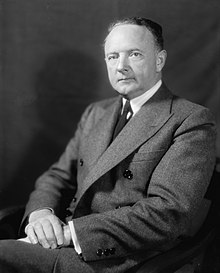Harry F. Byrd
| Harry F. Byrd | |
|---|---|
 |
|
|
United States Senator from Virginia |
|
|
In office March 4, 1933 – November 10, 1965 |
|
| Preceded by | Claude A. Swanson |
| Succeeded by | Harry F. Byrd, Jr. |
| 50th Governor of Virginia | |
|
In office February 1, 1926 – January 15, 1930 |
|
| Lieutenant | Junius Edgar West |
| Preceded by | Elbert Lee Trinkle |
| Succeeded by | John Garland Pollard |
| Member of the Virginia Senate from the 26th district |
|
|
In office January 9, 1924 – February 1, 1926 |
|
| Preceded by | James M. Dickerson |
| Succeeded by | Joseph S. Denny |
| Member of the Virginia Senate from the 10th district |
|
|
In office January 12, 1916 – January 9, 1924 |
|
| Preceded by | Frank S. Tavenner |
| Succeeded by | Marshall B. Booker |
| Personal details | |
| Born |
Harry Flood Byrd June 10, 1887 Martinsburg, West Virginia, U.S. |
| Died | October 20, 1966 (aged 79) Berryville, Virginia, U.S. |
| Political party | Democratic |
| Spouse(s) | Anne Douglas Beverley |
| Children |
Harry, Jr. Bradshaw Richard Beverley |
| Religion | Episcopalian |
| Signature | |
Harry Flood Byrd, Sr. (June 10, 1887 – October 20, 1966) of Berryville in Clarke County, Virginia, was an American newspaper publisher, and political leader of the Democratic Party in Virginia. He was the leader of the "conservative coalition" in the United States Senate, which largely blocked most liberal legislation after 1937.
He was a descendant of one of the First Families of Virginia. His ancestors included William Byrd II of Westover Plantation, who established Richmond, Robert "King" Carter of Corotoman, a colonial governor, and Pocahontas, and he was the brother of famed aviator Richard E. Byrd. His son Harry F. Byrd, Jr. succeeded him as U.S. Senator.
Byrd was a dominant figure in Virginia who reorganized and modernized Virginia's government. His political machine dominated Virginia Democratic Party politics for much of the first half of the 20th century. He was elected the 50th Governor of Virginia in 1925 and continued to lead a political faction that became known as the Byrd Organization as he represented Virginia as a United States Senator from 1933 until 1965.
Financial conditions in Virginia during his youth conditioned his thinking on fiscal matters throughout his life. He is best remembered for his austere "pay-as-you-go" financial policies. Byrd was also known as a racist and avowed white separatist. Byrd was vehemently opposed to racial desegregation of the public schools, and as such advocated a policy of "massive resistance" that led to closure of some public school systems in Virginia between 1959 and 1964. This policy created a large subset of black students who were denied their education in several Virginia counties. These students, many of whom are still alive, are known as the "lost generation." Although he never decided to become a candidate for the office, Byrd received a considerable number of votes in the 1956 presidential election and 15 electoral votes in the 1960 presidential election.
...
Wikipedia
